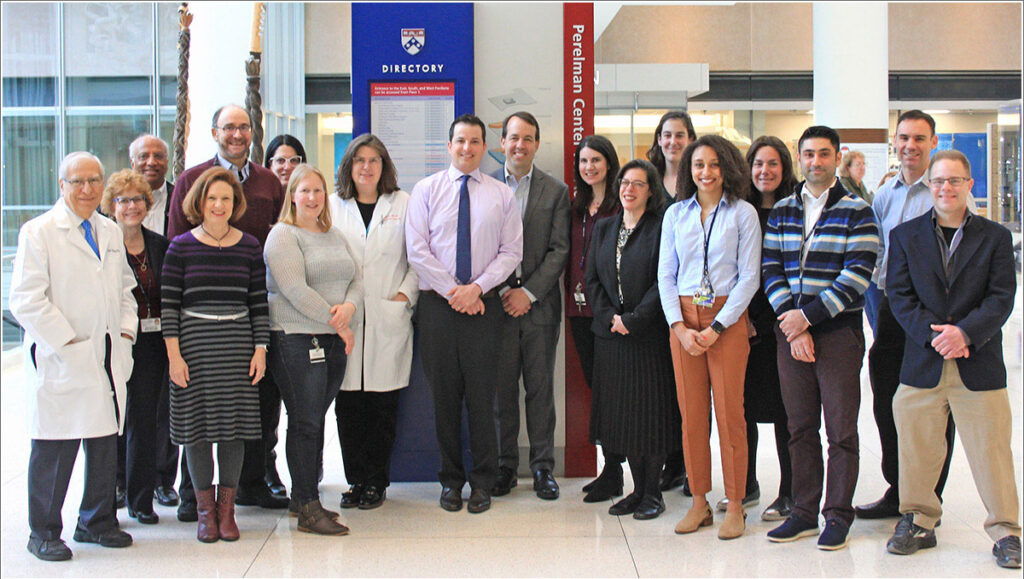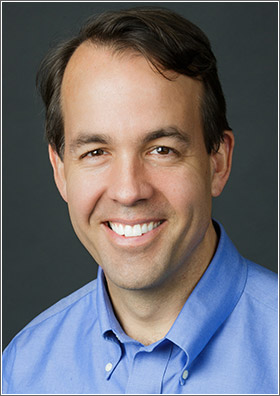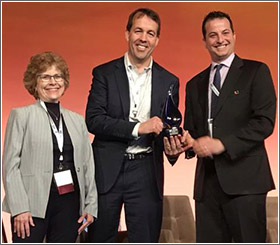News
Penn LDI Team Wins American Society of Transplantation 2020 Innovation Award
Cited for Pioneering Work in Using Hepatitis C-Infected Kidneys for Transplantation

Standing in the middle of some of the members of the Penn Medicine research team that won the American Society of Transplantation 2020 Innovation Award are Co-Principal Investigators David Goldberg, MD, MCSE, and Peter Reese, MD, MCSE. Goldberg, a former LDI Senior Fellow, is now an Associate Professor at the University of Miami; Reese is an Associate Professor in the Perelman School of Medicine and LDI Senior Fellow.
A University of Pennsylvania research team headed by Perelman School of Medicine Associate Professor and LDI Senior Fellow Peter Reese, MD, MSCE, and former LDI Senior Fellow Dave Goldberg, MD, MSCE, has received the American Society of Transplantation’s 2020 Innovation Award for ground-breaking work in the field of organ transplantation.
The award was announced March 7 at the AST’s Cutting Edge of Transplantation (CEoT) meeting in Phoenix, AZ. It honors the team’s THINKER project that pioneered the use of Hepatitis C-infected kidneys for transplants — an achievement that expands the supply of viable organs for a population of nephrology patients in desperate need of them. (THINKER stands for “Transplanting Hepatitis C Kidneys Into Negative Kidney Recipients.”)

‘Rare to see’
The AST ceremony cited Reese, Goldberg, their team, and the Philadelphia Gift of Life Donor Program, for “showing how HCV-infected organs could be transplanted safely into uninfected recipients. This group first proposed pilot kidney transplant trials in 2015, and published and presented seminal results in 2017 and 2018. Since then, this work has been adopted by a number of transplant centers worldwide and adapted to cardiac and lung transplantation by the University of Pennsylvania and many other centers. It is rare to see such innovative work by a multidisciplinary team make such rapid progress, with effective and efficient dissemination to so many other centers.”
“Back in 2015, David Goldberg and I and the rest of our team members were always alert for new possibilities that might increase the number of available donor kidneys because there is such a shortage,” Reese said in an interview with LDI. “We knew many patients on dialysis in the Philadelphia area waited for as long as seven years for a kidney transplant, and there was a good chance their health would deteriorate or that they might even die during the period of waiting for a transplant.”
Discarded organs
“At the same time, the opioid crisis was really starting to hit the country hard,” Reese said. “And that crisis was producing a lot of potential organ donors in their 30s whose families were committed to donating organs — but those kidneys were HCV infected and were discarded. It was such a big waste.”
“Into the middle of this,” he continued, “came brand new drugs that could cure HCV and allowed the possibility of putting HCV-infected organs into uninfected patients and then curing their HCV; it provided the possibility of expanding the number of available kidneys.”
But that plan wasn’t as easy as it sounded. The first unknown faced by the THINKER project was whether Penn’s large multidisciplinary transplantation team would fully get behind the idea of putting diseased organs into healthy bodies.
But they did.

Strong internal leadership
“We had very strong leadership on the issue with Peter Abt, MD, in the Division of Transplantation of the Department of Surgery, Emily Blumberg, MD, Director of Transplant Infectious Diseases, and Roy Bloom, MD, of Transplant Nephrology,” said Reese.
“Ultimately,” he continued, “the proposed THINKER studies underwent IRB review and review from an external data safety monitoring board. I can’t even tell you how many dozens of people had to participate: Surgeons, kidney and liver specialists, research coordinators, nurse coordinators, lab techs, administrators, patients and their families, and others; there were just so many people contributing to the success of this project.”
The second big unknown going into the first studies was whether the team could develop a process of informed consent that would be thorough and convincing to skeptics of the work.
“So, I would call a patient and say ‘This is Dr. Reese and we have this study to try to get you a kidney transplant sooner but it would involve infecting you with hepatitis C. Do you know what that is?” We’d start the conversation on the phone and go from there. The experience made me grateful for my background and collaborations in bioethics; that preparation and credibility really helped me through many of the details of the study.”
Cure rate concern
The third unknown of the study was uncertainty about what the actual HCV cure rates would be.
“Everyone was nervous that having even one patient who couldn’t be cured could put the program in jeopardy,” said Reese. But in the end, 100% of the THINKER team’s patients were cured in the first two studies demonstrating the procedure’s viability.
Since then, as noted by the AST judges, the THINKER procedure has spread unusually quickly to other medical centers. Penn and some of those centers are now expanding on it as they explore how to use the same methodology in the transplant of hearts, liver, and lung transplants.
Remaining challenges
But for all its successes, challenges still remain in this complex area of transplantation science.
“For one thing,” said Reese, “the number of patients and the published studies are fairly small, so there’s some concerns about initially-unanticipated transplant complications that ought to be manageable if we understood them better. “
“And for another,” he said, “we don’t yet have a pathway for insurance to pre-approve payment and there have been cases where therapy has been delayed. We know of centers where a patient received an organ and the application for insurance approval to treat hepatitis C went unresolved for weeks. We’d like to see insurance companies step up to approve payment in situations like this that are so time-sensitive.”